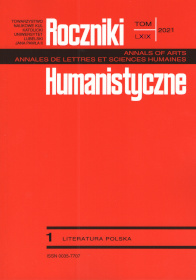How did the Score for Luigi Dallapicolla’s Il Prigioniero Find Its Way to the Library of Gustaw Herling-Grudziński?
Abstract
In this article I would like to show an episode of the colaboration of two eminant polish exile artists: composer Roman Palester and writer Gustaw Herling-Grudziński, which could lead (but finally didn’t) to the creation of unique piece of art.: an opera based on Grudzinski’s short novel The tower with Palester music. The starting point of the story is the attempt to explain how the score of Luigi Dallapiccola’ s opera Il Prigioniero found its way to writer’s library. The solution of this riddle is to be found in the letters of both artists. After short characteristic of lives and artistic road of both artists in the moment they meet, author go to the operetic fascinations of Palester: presents very shortly the history of unfinished opera The Living Stones, and also quotes the fragments of Palester’s letters to various writers concerning looking for the appriotriate libretto. In the end, after many propositions, it turns out that the best material for the composer is Grudziński’s The Tower short novel, which only needed some adaptations. And it was exactly beccause of ths, with the suggestion of Palester, Herling bought the score of Prigioniero, which now we can find in writer’s library. The long fragment of Grudziński’s letter, shows us, how deeply both artist were involved in this project. Finally the project failed. The rest of the artickle describes the furter history of this project, trying to to find out why the fantastic artistic duet Grudzinski–Palester finally never came to being. At the end we look through some further project of colaboration of both exiles, which also failed.
References
Archiwum Gustawa Herlinga-Grudzińskiego w Neapolu, sygn. 53 [ArGHG]
Listy Romana Palestra do Gustawa Herlinga-Grudzińskiego
Archiwum Kompozytorów Polskich Biblioteki Uniwersyteckiej w Warszawie (zbiory nieopracowane) [ArKP]
Listy Gustawa Herlinga-Grudzińskiego do Romana Palestra
Biblioteka Polska w Paryżu (zbiory nieopracowane, nr akcesji 7221/1-2) [BPP]
List Romana Palestra do Kazimierza Wierzyńskiego z 19 listopada 1955
Biblioteka Gustawa Herlinga-Grudzińskiego, Inwentarz, oprac. Dorota Fortuna, Instytut Dokumentacji i Studiów nad Literaturą Polską, 2019.
Helman, Zofia. Roman Palester. Twórca i dzieło. Musica Iagiellonica, 1999.
Herling-Grudziński, Gustaw. Dziennik pisany nocą, t. III. Wydawnictwo Literackie, 2012.
Kudelski, Zdzisław. Gustaw Herling Grudziński i „Kultura” paryska. Fakty – historia – świadectwa. Towarzystwo Naukowe KUL, 2013.
„Listy Romana Palestra do Jerzego Stempowskiego”. Wiadomości Kulturalne, nr 11, 1994, s. 22.
Muzeum Literatury w Warszawie, sygn. 667, t. XII [ML]
List Romana Palestra do Stanisława Balińskiego z 19 listopada 1955
Palester, Roman. Słuch absolutny. Niedokończona autobiografia i listy z lat wojny. Wstęp i oprac. Zofia Helman, Polskie Wydawnictwo Muzyczne, 2017.
Wejs-Milewska, Violetta. Radio Wolna Europa na emigracyjnych szlakach pisarzy. Gustaw Herling-Grudziński, Tadeusz Nowakowski, Roman Palester, Czesław Straszewicz, Tymon Terlecki. Arcana, 2007.
Copyright (c) 2021 Roczniki Humanistyczne

This work is licensed under a Creative Commons Attribution-NonCommercial-NoDerivatives 4.0 International License.





